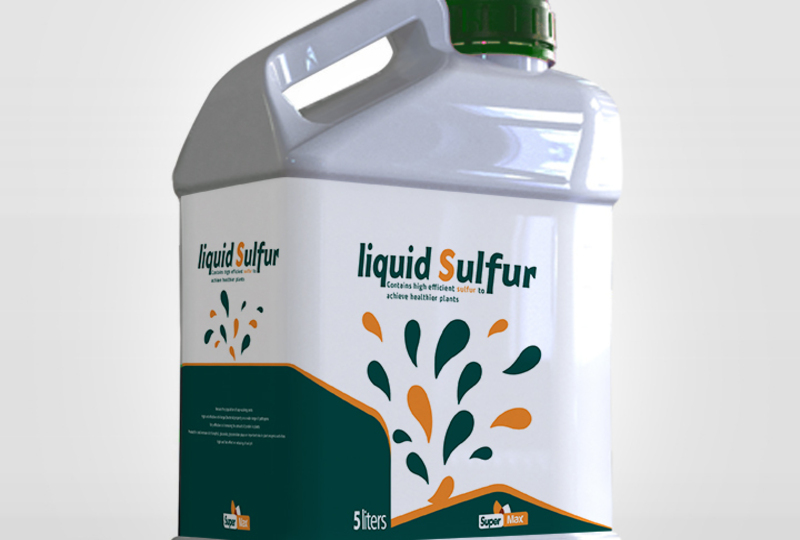Maximizing Crop Production with Liquid Sulfur Fertilizer : Understanding the Benefits and Best Practices
Liquid sulfur is a versatile and effective fertilizer that is widely used in agriculture to enhance crop growth and improve soil health. In this article, we will discuss the benefits of liquid sulfur, how it works, and how to use it in your agricultural operations.
What is Liquid Sulfur Fertilizer ?
Liquid sulfur is a solution of sulfur in water, typically with a concentration of 10–30% sulfur. It is made by dissolving elemental sulfur in water and is available in both liquid and sprayable forms. Liquid sulfur can be used by plants right away, unlike other forms of sulfur. This makes it a valuable tool for improving soil fertility.
Benefits of Liquid Sulfur for Agriculture
- Improves Soil Health: Sulfur is an essential micronutrient for plants and is critical for the formation of key plant tissues and enzymes. Liquid sulfur can help improve the health and fertility of the soil by making sulfur easy to get to.
- Increases Yield: Liquid sulfur can improve crop yields by increasing the efficiency of photosynthesis and promoting healthy root development. In addition, it can help crops better resist stress and disease, resulting in higher yields and improved crop quality.
- Controls Diseases: Liquid sulfur has antifungal and antibacterial properties that can help control plant diseases. For example, it is effective against powdery mildew, a common disease that affects many crops, including grapes and strawberries.
- Reduces Alkalinity: Liquid sulfur is effective at reducing soil alkalinity, which can be a major problem in many agricultural regions. By lowering the pH of the soil, liquid sulfur makes it easier for plants to get nutrients like phosphorus and zinc that are often hard to get in alkaline soils.
- Promotes Beneficial Microorganisms: Sulfur is also important for the growth of beneficial soil microorganisms, such as mycorrhizal fungi and nitrogen-fixing bacteria. By providing a source of sulfur, liquid sulfur can help promote the growth of these beneficial microorganisms, which in turn can improve soil health and fertility.
How Liquid Sulfur Works Liquid sulfur works by acidifying the soil, which helps make other nutrients more available to plants. It also provides a source of sulfur, which is an essential micronutrient for plant growth.
When applied to the soil, liquid sulfur reacts with water to form sulfuric acid, which then reacts with the soil to create sulfur-containing compounds. These compounds are then taken up by plant roots, where they are used for a variety of metabolic processes, including photosynthesis and the formation of plant tissues and enzymes.
How to Use Liquid Sulfur in Agriculture
- Soil Application: Liquid sulfur can be applied directly to the soil, either as a broadcast application or as a band application. It is best to use liquid sulfur in the fall, when the soil is cool, so that plants can get the most out of it.
- Foliar Spray: Liquid sulfur can also be applied as a foliar spray, which is useful for correcting sulfur deficiencies in crops. To use liquid sulfur as a spray for the leaves, dilute the solution according to the instructions on the bottle and spray the leaves until they are all covered.
- Irrigation Water: Liquid sulfur can also be applied to crops through irrigation water. To do this, simply add the recommended amount of liquid sulfur to the irrigation water and run it through the fields.
Conclusion
Liquid sulfur is an effective and versatile fertilizer that can provide a range of benefits for agriculture. By improving soil health, increasing yields, controlling diseases, reducing soil alkalinity, and promoting beneficial microorganisms, liquid sulfur can help farmers maximize their crop production.
FAQ:
Q: What is liquid sulfur fertilizer?
Ans. Liquid sulfur fertilizer is a solution of sulfur in water, with 10–30% sulfur by weight. It is made by mixing elemental sulfur with water. It can be used as a liquid or as a spray.
Q: What’s good about using liquid sulfur fertilizer in farming?
Ans. Liquid sulfur fertilizer can improve the health of the soil, boost crop yields, prevent plant diseases, lower the alkalinity of the soil, and encourage the growth of good microorganisms in the soil.
Q: How does fertilizer with liquid sulfur work?
Ans. Liquid sulfur fertilizer works by making the soil more acidic, which helps plants get more of the nutrients they need. It is also a source of sulfur, which is a micronutrient that plants need to grow.
Q: How do you put liquid sulfur fertilizer on the ground?
Ans. Liquid sulfur fertilizer can be put directly on the soil as a broadcast or band application, sprayed on the leaves of plants that don’t have enough sulfur, or put in irrigation water.
Q: When is the best time to fertilize plants with liquid sulfur?
Ans: The best time to use liquid sulfur fertilizer on crops is in the fall, when the soil is cool and the plants can get the most out of it.
Q: Does liquid sulfur fertilizer help keep plants from getting powdery mildew?
Ans. Yes, liquid sulfur fertilizer has antifungal and antibacterial properties that can help control plant diseases, such as powdery mildew in grapes and strawberries.
Q: Can you mix liquid sulfur fertilizer with other types of fertilizer?
Ans. Yes, liquid sulfur fertilizer can be used with other fertilizers and is often combined with nitrogen fertilizers to improve their effectiveness.
Q: Is liquid sulfur fertilizer safe for the environment?
Ans. Most people think that liquid sulfur fertilizer is safe for the environment when used as directed. To avoid any possible dangers, it is important to follow the manufacturer’s instructions for how to use and store the product.
Also Read :-
Silicone Adjuvant for Agriculture : Improving Pesticide Efficiency and Crop Protection







